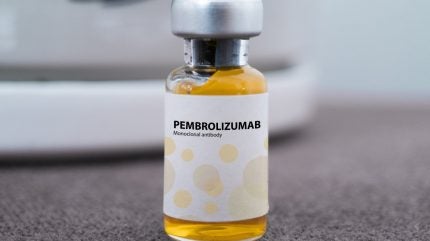
The Japanese Ministry of Health, Labor and Welfare (MHLW) has approved MSD’s anti-programmed death receptor-1 (PD-1) therapy KEYTRUDA (pembrolizumab) for lung and urothelial cancer indications.
The approved indications are non-small cell lung carcinoma (NSCLC) and radically unresectable urothelial carcinoma.

Discover B2B Marketing That Performs
Combine business intelligence and editorial excellence to reach engaged professionals across 36 leading media platforms.
The first allows for the use of KEYTRUDA with chemotherapy as a neoadjuvant treatment, followed by its continuation as monotherapy for adjuvant treatment in NSCLC patients.
This approval stems from the results of the Phase III KEYNOTE-671 clinical trial.
KEYTRUDA is also approved for use along with Padcev (enfortumab vedotin-ejfv) as a first-line treatment for patients with radically unresectable urothelial carcinoma.
The decision is based on results from the Phase III KEYNOTE-A39 (EV-302) clinical trial, carried out in partnership with Pfizer and Astellas.

US Tariffs are shifting - will you react or anticipate?
Don’t let policy changes catch you off guard. Stay proactive with real-time data and expert analysis.
By GlobalDataKEYTRUDA monotherapy has also been approved for patients with radically unresectable urothelial carcinoma ineligible for any platinum-containing chemotherapy.
This indication is supported by findings from the Phase II KEYNOTE-052 trial.
A humanised monoclonal antibody, the therapy can enhance the immune system’s potential to detect and combat tumour cells.
It works by hindering the interaction between PD-1 and its ligands, PD-L1 and PD-L2, activating T lymphocytes which can impact both tumour and healthy cells.
More than 1,600 trials are currently studying KEYTRUDA across various cancers and treatment settings.
Merck Research Laboratories global clinical development oncology head and senior vice-president Dr Marjorie Green stated: “For certain patients in Japan who are diagnosed with resectable non-small cell lung carcinoma and radically unresectable urothelial carcinoma, there is a need for new, effective treatment options.
“With these new approvals, we look forward to providing KEYTRUDA as monotherapy and in combination with other treatment regimens as we aim to address the unmet needs of these patients.”
The latest development comes after the company received US Food and Drug Administration approval for the KEYTRUDA regimen as a first-line treatment for adults with unresectable advanced or metastatic malignant pleural mesothelioma.




